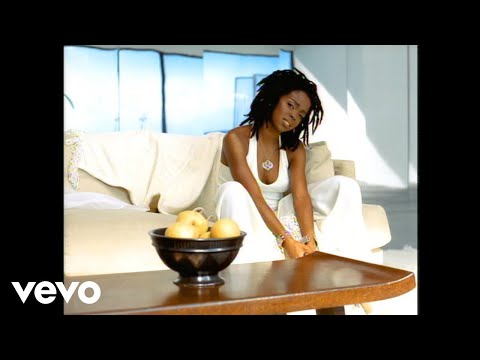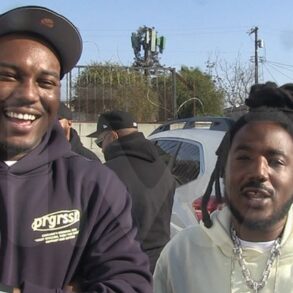In the beginning, there was Ms. Lauryn Hill.
In 1992, she emerged as a phenom as the first lady of The Fugees. Composed of Hill, Wyclef Jean, and Pras Michel, the group solidified themselves as a hip-hop powerhouse before their controversial split in 1997. Instead of crumbling, though, Hill rose even higher with her debut solo album, 1998’s “The Miseducation of Lauryn Hill.” The album — which she’s primarily credited with writing, producing, and arranging — quickly cemented Hill’s lasting impact in hip-hop.
“Miseducation” not only provided a distinct onset of timeless lessons taken from the informal school of Ms. Hill, but it also was her audible love letter to hip-hop, Black women, and the communal Black experience.
“Yo hip-hop, started out in the heart / Now everybody tryin’ to chart,” Hill rapped on “Superstar.” As she spoke to the need of maintaining one’s self amid fame to govern true artistic integrity, Hill cleverly used her past experience in the industry to discuss issues she’s faced as a Black woman in hip-hop, both as a praised superstar and a potential target.
Now, as the album marks its 25th anniversary alongside hip-hop turning 50, we’re revisiting what makes it such a fundamental part of hip-hop history — and its enduring life lessons straight from Hill herself. In spite of the backlash she’s received for her crowning glory over the years (including accusations of musical theft and improper accreditation), the New Jersey native persevered nonetheless — declaring in her 2018 Medium essay that she is “the [sole] architect of [her] creative expression.”
“With ‘The Miseducation,’ there was no precedent. I was, for the most part, free to explore, experiment and express,” Hill, now 48 and a mother of six, explained to Rolling Stone in January 2021. “After ‘The Miseducation,’ there were scores of tentacled obstructionists, politics, repressing agendas, unrealistic expectations, and saboteurs EVERYWHERE. People had included me in their own narratives of THEIR successes as it pertained to my album, and if this contradicted my experience, I was considered an enemy.” In the age of cancel culture, it’s something that she and fellow women rappers continue to deal with.
Then and now, “Miseducation” was about addressing community as a testament of relatability. On “Doo Wop (That Thing),” she states, “Don’t be a hard rock when you really are a gem / Baby girl, respect is just a minimum / N****s f*cked up and you still defending ’em / Now, Lauryn is only human / Don’t think I haven’t been through the same predicament.” The breakout single garnered commercial success with two Grammy wins for best R&B song and best female R&B vocal performance as Hill sermonized why we need to be cautious about how we approach internal and external relationships with the famous proverb, “How you gon’ win when you ain’t right within?”
One walked so the other could run.
Meanwhile, Hill’s revered ballad “To Zion” offered a conscious ode to impending motherhood. “Unsure of what the balance held / I touched my belly overwhelmed / By what I had been chosen to perform . . . But everybody told me to be smart / ‘Look at your career,’ they said / ‘Lauryn, baby use your head’ / But instead I chose to use my heart,” she sang to her then-unborn son Zion.
Cardi B faced similar condemnation in 2018 when she revealed she was pregnant with her daughter, Kulture. But instead of folding under pressure, the Bronx-bred emcee tweeted, “I started winning when the whole world was doubting on me! think imma lose with my little baby counting on me?” It seemed to piggyback off Hill’s explanation of “To Zion.”
As Hill put it in her own Medium essay: “The song To Zion gave encouragement to women during challenging pregnancies. There are children who were given a chance at life because their Mothers experienced moral and emotional support through this song.”
It’s no coincidence that after Hill first won best rap album with The Fugees at the 1997 Grammys and swept at the 1999 ceremony — taking home five of 10 nominations, which included album of the year, best R&B album, and best new artist — Cardi became the first woman emcee to win best rap album as a solo artist in 2019 with her debut LP, “Invasion of Privacy.” One walked so the other could run.
Hill not only paved a way for women rappers to be all-encompassing, but she also created what is controversially one of the best diss tracks in hip-hop history. With “Lost Ones,” she apparently addressed the affair and severed personal relationship she had with Fugees band member Jean. She chose violence straight out of the gate, rapping on her LP’s second track, “It’s funny how money change a situation / Miscommunication lead to complication / My emancipation don’t fit your equation . . . Some wan’ play young Lauryn like she dumb / But remember not a game new under the sun / Everything you did has already been done.”
Danyel Smith, former editor in chief of Vibe and host of the podcast “Black Girl Songbook,” noted on her “The Diss-Education of Lauryn Hill” episode from March 2021, “While there’s so much going on on ‘Lost Ones,’ it’s exquisitely focused and refined. Diss records are called diss records because one rapper is being disrespectful of another. ‘Lost Ones’ wins because Lauryn is being respectfully disrespectful.” Smith also broke down the track bar for bar, unpacking everything from Hill’s subtle confrontation of her ex’s insecurities, manipulation, and hypocrisy to gaslighting, the self-awareness of her infancy in the game, and the threat of karma.
After the hostile outpouring of emotions on “Lost Ones,” the track “I Used to Love Him” featuring Mary J. Blige welcomed that communal embrace of sisterhood and pain. On the track, Hill and Blige both analyze their transgressions from the toxic aftermath of relationships as they seek and accept spiritual repentance. “But my heart is gold, see, I took back my soul / And totally let my creator control / The life which was his, the life which was his to begin with,” they conjointly sing. The collaboration remains underrated in the grander conversation of hip-hop and R&B duets, even though this is one of the more R&B-leaning records on the album. But in true Hill fashion, she has no problem being an outlier among the crowd.
Hill truly offered Black women a belief in self.
During a time when the “sexualization of the Black female body was the standard,” as Hill wrote for Medium, she stood for something different. As a dark-skinned, innately talented, beautiful, cognizant woman with swag who could masterfully articulate the complexities of being such, Hill combated the boys’ club rhetoric by being “a breath of fresh air, a hope and — unrealistically — a solution to what was wrong with hip-hop and its representation of women at the time,” author Joan Morgan wrote in “She Begat This: 20 Years of The Miseducation of Lauryn Hill.” Hill truly offered Black women a belief in self and intimate sensuality without the ascendant hypersexualization.
And she allowed that complexity to shine through in a combination of sound and lyricism. My favorite aspect about “Miseducation” is that it’s a perfect marriage of hip-hop and R&B. It makes sense for fans of either genre to be torn about how to categorize the album. Hill’s bars are poetic and intentional, but she also showcases her softer side with romantic hymns.
“Tell Him,” a song of yearning, finds Hill reprising biblical references to express the depths of her love — “Let me be patient, let me be kind . . . ‘Cause love is not boastful / Oooh and love is not loud.” Then you have “Can’t Take My Eyes Off of You,” one of those covers that feels so much like a precursor as Hill puts her artistic twang on the Frankie Valli original. Of course, there’s “Ex-Factor,” which taught the masses the word “reciprocity” and gave a succinct definition in the opening line: “It could all be so simple / But you’d rather make it hard.” “Miseducation” does an immediate 180 as a gentle Hill analyzes shattering heartbreak and questions shortcomings on the track: “Is this just a silly game / That forces you to act this way? / Forces you to scream my name / Then pretend that you can’t stay.” Despite Jean being the unnamed muse of a solid portion of the LP, the song emotes a much-needed catharsis on Hill’s part.
And finally, the D’Angelo-assisted offering “Nothing Even Matters” is arguably one of the few perfect love songs to ever exist, alongside modern-day records like H.E.R. and Daniel Caesar’s “Best Part.” Sandwiched in between the raw storytelling on “Every Ghetto, Every City” and the blaring speaking-in-tongues philosophy on “Everything Is Everything,” this ballad put every other narrative on pause and transported listeners into another dimension. It was as though Hill needed a reminder of what healthy love was — personified, concrete, and tangible.
When Hill recorded her unofficial live sophomore album, “MTV Unplugged No. 2.0,” she shared, “I’m just retired from the fantasy part,” referring to the “public illusion” that “held [her] hostage” during the marvel of “Miseducation.” While the debut may be her freedom cry, we’re thankful the masterpiece exists.
In February 2021, “Miseducation” earned its well-deserved diamond certification from the RIAA, and it remains a staple among music lovers. This goes to show that if you’re going to have one studio album quantify your entire musical legacy, let it be something like Hill’s debut.
“Miseducation” is her alpha and omega — a body of work so impactful that it continues to inspire generations. Where would we be as a culture without the genius, vulnerability, and passion displayed on “Miseducation”? It’s a sonic work of innovation; a heartfelt tale of womanhood; a detailed, earnest journey of adulthood; and a clever outpouring so majestic that one album was just enough. And when it’s all said and done, it’ll forever stand the test of time. Amen.
This post was originally published on this site be sure to check out more of their content.













